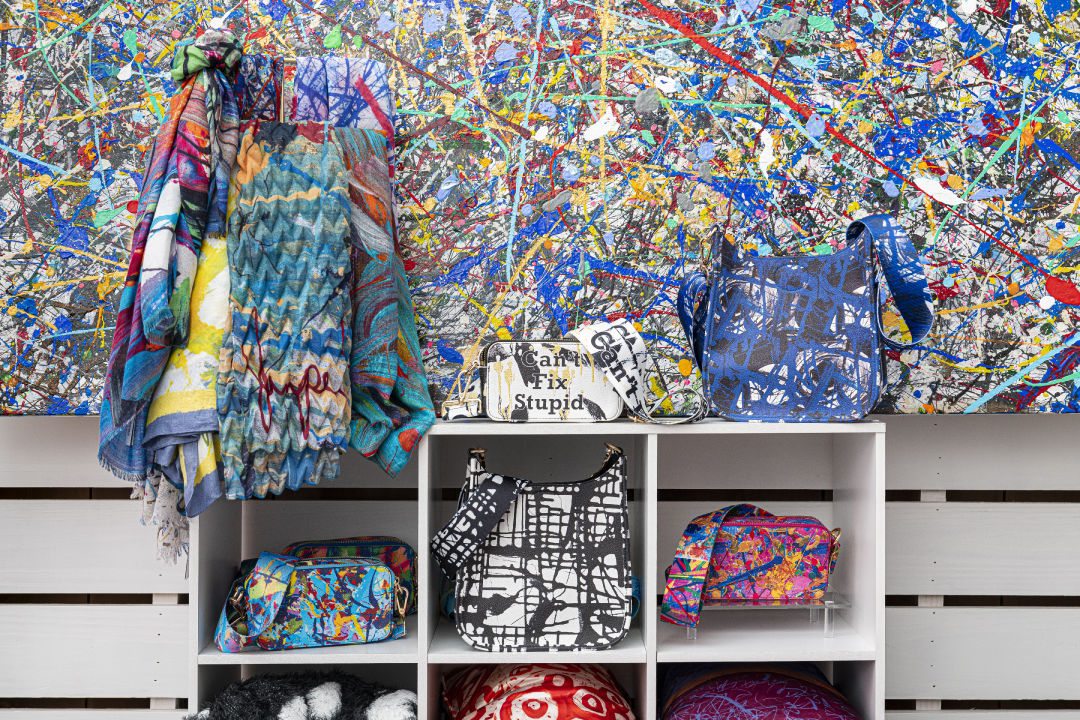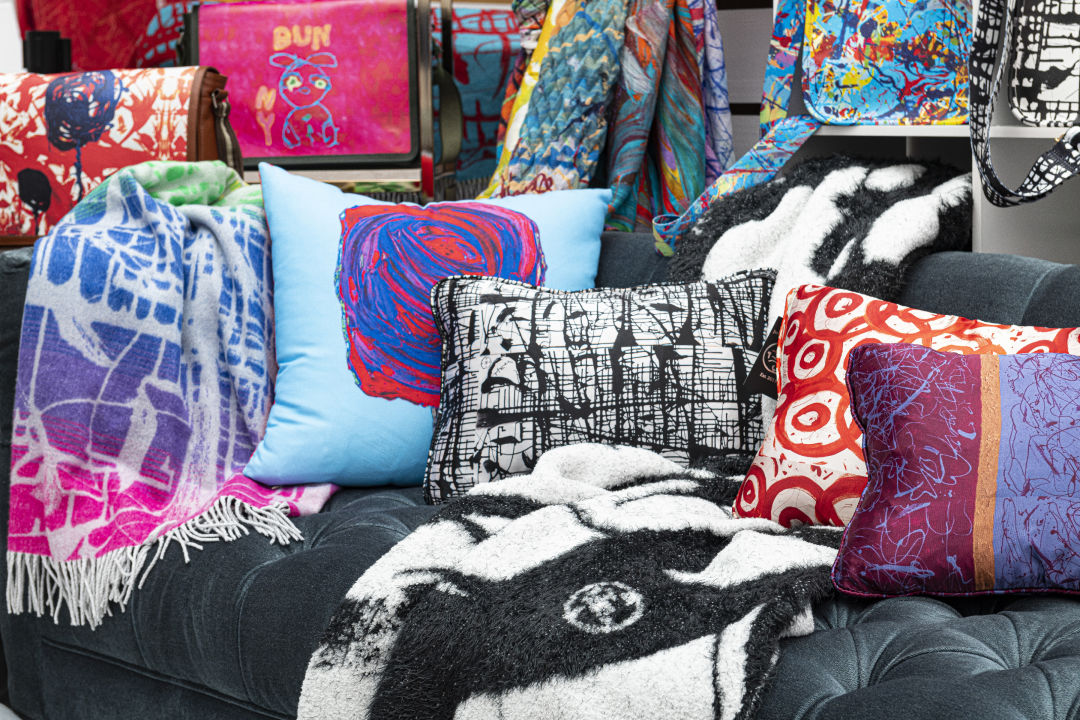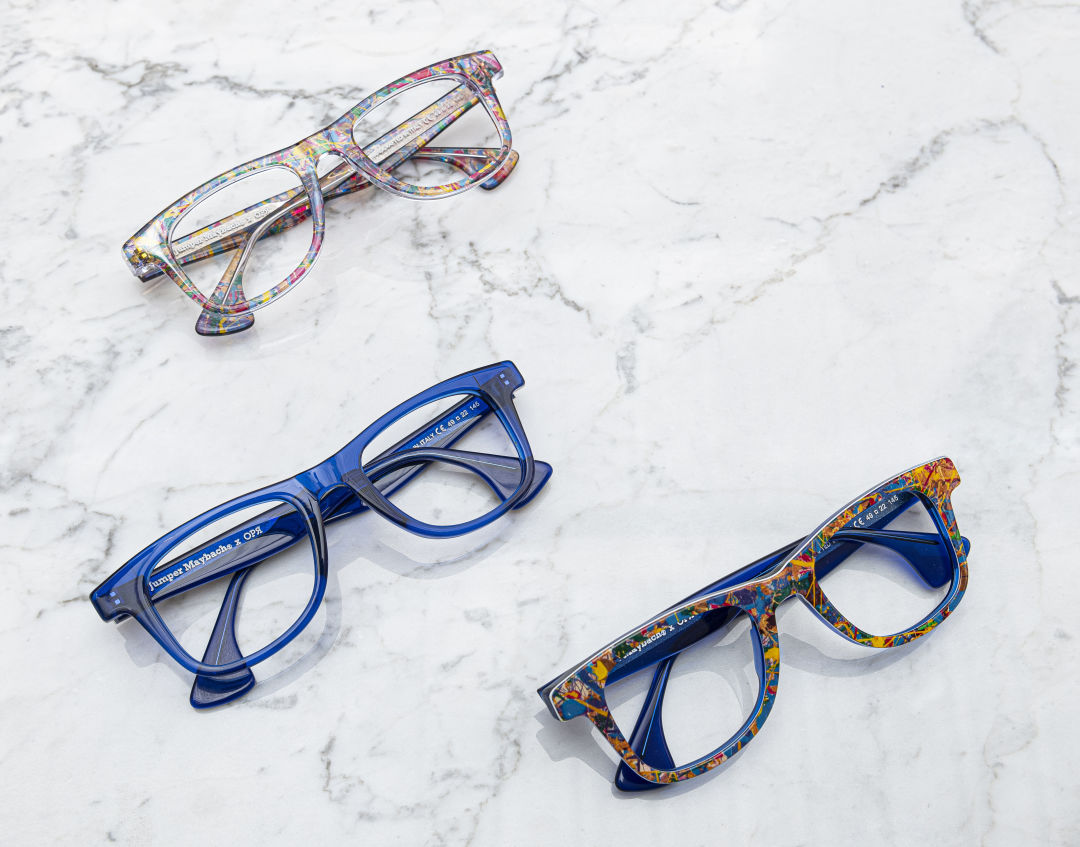HOUSTON IS HOME TO A PLETHORA OF ARTISTS with unique and unconventional origin stories; one such artist is Jumper Maybach, who creates art as a way to heal himself and the world from various forms of hate.
Maybach, now an internationally renowned modern artist and public figure, was born in Corpus Christi as Ben Workman. After experiencing workplace bullying and discrimination based on his sexuality, he said, Workman eventually found his identity as Jumper Maybach.
Fed up with being harassed for being gay, Workman said he knew it was time for a significant change. Using the wisdom of his grandfather—a professional clown who nicknamed him “Jumper” as a child—he created an artistic persona that honored the part of him that was being oppressed.
But Jumper Maybach’s emergence didn’t come easily or quickly, he said. Ben Workman needed to work up the courage to make such a profound shift in his professional life.
“I was actually working [at] that government job for 37 years,” Maybach said. “I was bullied on the job because I was a gay man. People [who] have never been bullied before don’t understand it. It got to the point where I didn’t even want to go to work anymore.”
When Maybach finally did quit the job, he was immediately thrust into a brand-new world of both exciting creative opportunities and daunting life and business challenges.

Maybach’s apparel line includes items like scarves and messenger bags with his artwork printed on them.
IMAGE: ANTHONY RATHBUN
“When I started off, I had no art training, I had no business training,” Maybach said. “Talk about a learning curve! I had to fine-tune and tweak constantly. All of it is a constant change to try to navigate what it takes to become known, because if you’re not known, your art will never get picked up.”
“The whole point of doing art is for people to enjoy it and love it, and support the cause,” Maybach said.” If you don’t have that outlet and people don’t know about you, you’ll fail it. And I don’t have [a] problem with asking for help.”
Maybach’s willingness to be open to learning and growing, even after having spent more than three decades behind a desk, paid off almost immediately. Within three years of his debut, Maybach’s art—best described as an abstract, broad-brushed approach that features lots of heavy ink, bold colors, and the occasional hand lettered inspirational message—was showcased internationally. From Dubai to Italy, Barcelona to Austria. Maybach’s work has even been shown in the Louvre.
Maybach said his courage came from his ability to fearlessly prioritize his own happiness over making money, and by surrounding himself with people who enrich his life.
“I think a lot of people tend to hold back because [they think] ‘I don’t have the money,’” Maybach said. “If you really want to make a change and it’s really important to you, money isn’t everything. Your happiness is more important than staying on a job that is destroying you every day.
“Life is too short to spend in an environment that just pays your bills. Sometimes you have to take a chance [and] surround yourself with people who support you. There’s a lot of naysayers out there—a lot of people who are negative. You have to keep looking until you find a group that supports you.”
Finding that support in Houston wasn’t always easy, according to Maybach.
“When I went through this entire process, I had to figure out, ‘Where’s the art world, where are the artists, and where are they in Houston?’ I didn’t really know where studios were, and that’s when I discovered the Heights. My first studio was over in the Heights, it was eight foot by eight foot—it was a tiny room. The last five years, I’ve been over here in Sawyer Yards at Sabine Street Studios; now my studio is 1,200 [square] feet.”

Items from the Jumper Maybach home collection include throw pillows, blankets, candles, and rugs.
IMAGE: ANTHONY RATHBUN
When Maybach first started painting in that small Heights studio, his Jumper persona emerged, clown makeup and all—what he calls an elaborate mask that he used to engage with the parts of himself that had been mocked and ridiculed. But as time has gone on, Jumper the clown has come out less and less, and Maybach said today he’s able to embrace his whole self—sans clown—and reach a point of what he calls self-actualization.
“I discovered that once I started healing, I was proud to be me, and I [got] past what happened to me,” Maybach said. “As a gay kid, I went through a lot of bullying. Then I discovered that when kids are bullied, they bring that with them as adults to their work.
“In the beginning, I had to wear makeup to express myself. People would get freaked out when I walked in the room, but then they started realizing I was just as human as they are, and Jumper was just as cool as anybody else on planet Earth.
“I feel like I’m in a healed spot in my life,” Maybach said. “But who knows, Jumper may come out [again], and I might want to put on some clown makeup. But right now, I feel comfortable. When I first started off, I thought if I took the makeup off, I couldn’t paint anymore. I had a psychological block. But I think the two of them [Ben and Jumper] merged together.”
Maybach said he is committed to sharing his journey to self-acceptance with others: “I always believe in my mission to end hate, intolerance, and bullying in the world, and to use art as a way to do that.”
So far the Jumper Maybach persona has created a successful art brand and business, and has even embarked on producing a line of designer eyewear.
Even though Jumper Maybach reaches audiences far and wide, he said Houston remains a special place, as it’s where he found the courage and motivation to transition from desk work to creating internationally shown pieces.

Maybach has also designed a line of Italian eyewear for OPR called Jumper Maybach OPR: The Expression of Art and Love.
IMAGE: ANTHONY RATHBUN
“This is where I started, I love Houston,” Maybach said. “It will always be a part of my life. I will always have some type of significant presence here that’s really important. As I grow, it looks like [I’ll be an] artist in residence in different places. I will probably be creating in different parts of the country, but Houston will always be my home.”
Maybach’s love for Houston is reflected in his support of small, mom-and-pop businesses and restaurants. He said his favorite spots in town are Pasha Turkish Restaurant and Federal Grill. When he’s not chowing down on the local lunch scene, he said he enjoys the city’s greenery, something unique to Houston’s cityscape: “I love walking down Allen Parkway—all the little paths we have. [I love] the Heights—walking paths down the bayou. I love the walking paths, the bicycle trails, [and] the parks.”
Maybach also participates in Houston’s business arena as a member of the Greater Houston LGBTQ Chamber of Commerce, an organization that dubs itself “a leading economic voice in the greater Houston region.”
“They’ve been great supporters of mine, and I’ve been a great supporter of them,” Maybach said. “I think [it’s] important that LGBTQ businesses [support] each other from the standpoint of camaraderie—where you can all get together and discuss issues that you’re having in your business. You have that network, and you can gain business momentum from having support in our community.”
Maybach’s support for the community also extends to local youth who may be struggling with the same bullying he experienced, citing the Montrose Center—an LGBTQ community center—as a resource for young people who are wrestling with hate at home, school, or even at work. So that eventually, anyone struggling with their identity or sexuality won’t have to hide who they truly are.

